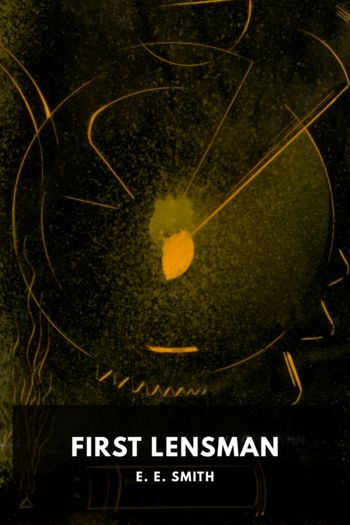First Lensman - E. E. Smith (nonfiction book recommendations .txt) 📗

- Author: E. E. Smith
Book online «First Lensman - E. E. Smith (nonfiction book recommendations .txt) 📗». Author E. E. Smith
Under the impact of those unimaginable torrents of force the screens of the engulfed vessels flashed once, practically instantaneously through the spectrum, and went down. Whether they had two or three or four courses made no difference—in fact, even the ultra-speed analyzers of the observers could not tell. Then, a couple of microseconds later, the wall-shields—the strongest fabrics of force developed by man up to that time—also failed. Then those ravenous fields of force struck bare, unprotected metal, and every molecule, inorganic and organic, of ships and contents alike, disappeared in a bursting flare of energy so raw and so violent as to stagger even those who had brought it into existence. It was certainly vastly more than a mere volatilization; it was deduced later that the detonating unstable isotopes of the Black’s own bombs, in the frightful temperatures already existing in the Patrol’s quasi-solid beams, had initiated a chain reaction which had resulted in the fissioning of a considerable proportion of the atomic nuclei of usually completely stable elements!
The cylinder stopped; the Lensmen took stock. The depth of erosion of the leading edge had averaged almost exactly six double rings of drones. In places the sixth ring was still intact; in others, which had encountered unusually concentrated beaming, the seventh was gone. Also, a fraction of one percent of the manned war-vessels had disappeared. Brief though the time of engagement had been, the enemy had been able to concentrate enough beams to burn a few holes through the walls of the attacking cylinder.
It had not been hoped that more than a few hundreds of Black vessels could be blown out of the ether at this first pass. General Staff had been sure, however, that the heaviest and most dangerous ships, including those carrying the enemy’s High Command, would be among them. The midsection of the apex of the conventional Cone of Battle had always been the safest place to be; therefore that was where the Black admirals had been and therefore they no longer lived.
In a few seconds it became clear that if any Black High Command existed, it was not in shape to function efficiently. Some of the enemy ships were still blasting, with little or no concerted effort, at the regulation cone which the cylinder had left behind; a few were attempting to get into some kind of a formation, possibly to attack the Patrol’s cylinder. Indecision was visible and rampant.
To turn that tremendous cylindrical engine of destruction around would have been a task of hours, but it was not necessary. Instead, each vessel cut its tractors and pressors, spun end for end, reconnected, and retraced almost exactly its previous course; cutting out and blasting into nothingness another “plug” of Black warships. Another reversal, another dash; and this time, so disorganized were the foes and so feeble the beaming, not a single Patrol vessel was lost. The Black fleet, so proud and so conquering of mien a few minutes before, had fallen completely apart.
“That’s enough, Rod, don’t you think?” Samms thought then. “Please order Clayton to cease action, so that we can hold a parley with their senior officers.”
“Parley, hell!” Kinnison’s answering thought was a snarl. “We’ve got ’em going—mop ’em up before they can pull themselves together! Parley be damned!”
“Beyond a certain point military action becomes indefensible butchery, of which our Galactic Patrol will never be guilty. That point has now been reached. If you do not agree with me, I’ll be glad to call a Council meeting to decide which of us is right.”
“That isn’t necessary. You’re right—that’s one reason I’m not First Lensman.” The Port Admiral, fury and fire ebbing from his mind, issued orders; the Patrol forces hung motionless in space. “As President of the Galactic Council, Virge, take over.”
Spy-rays probed and searched; a communicator beam was sent. Virgil Samms spoke aloud, in the lingua franca of deep space.
“Connect me, please, with the senior officer of your fleet.”
There appeared upon Samms’ plate a strong, not unhandsome face; deep-stamped with the bitter hopelessness of a strong man facing certain death.
“You’ve got us. Come on and finish us.”
“Some such indoctrination was to be expected, but I anticipate no trouble in convincing you that you have been grossly misinformed in everything you have been told concerning us; our aims, our ethics, our morals, and our standards of conduct. There are, I assume, other surviving officers of your rank, although of lesser seniority?”
“There are ten other vice-admirals, but I am in command. They will obey my orders or die.”
“Nevertheless, they shall be heard. Please go inert, match our intrinsic velocity, and come aboard, all eleven of you. We wish to explore with all of you the possibilities of a lasting peace between our worlds.”
“Peace? Bah! Why lie?” The Black commander’s expression did not change. “I know what you are and what you do to conquered races. We prefer a clean, quick death in your beams to the kind you deal out in your torture rooms and experimental laboratories. Come ahead—I intend to attack you as soon as I can make a formation.”
“I repeat, you have been grossly, terribly, shockingly misinformed.” Samms’ voice was quiet and steady; his eyes held those of the other. “We are civilized men, not barbarians





Comments (0)